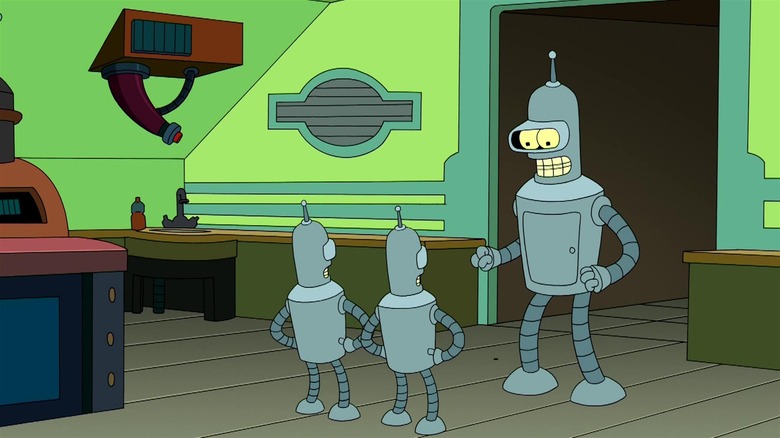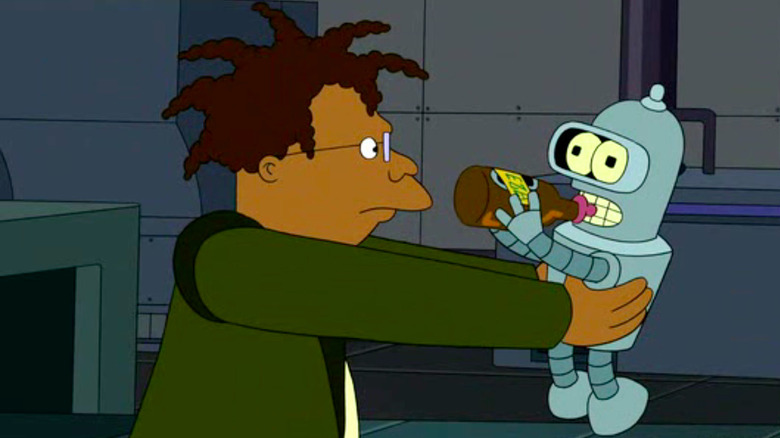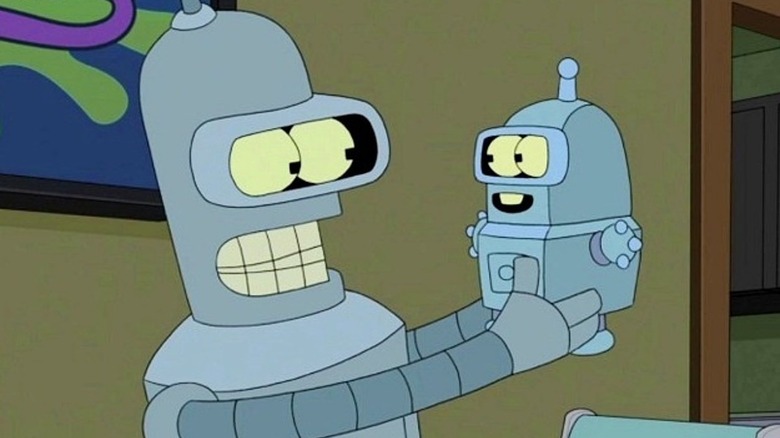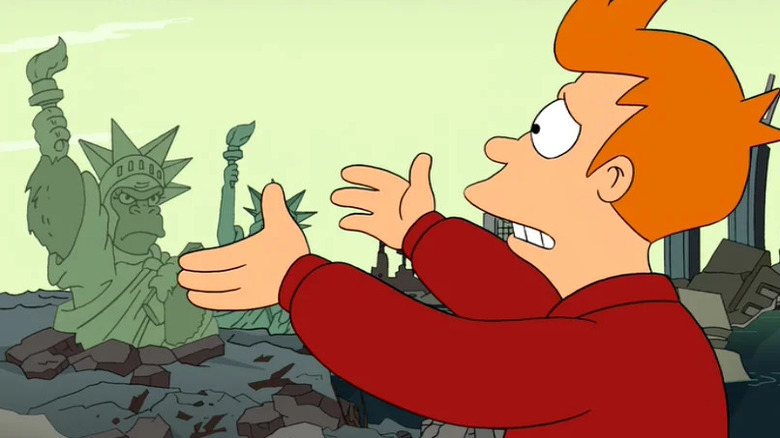Futurama Gave Itself A Clever Excuse For Ignoring Any Continuity Errors
As one must always recall when talking about "Futurama," it's a show made by genius sci-fi nerds. Those who know the show likely know that its writers' room is full of people with advanced degrees in mathematics and computer science, a fact that plays itself out in multiple gags throughout the series; there is, for instance, an oblique math reference involved in Bender's serial number. And while Math may prepare the mind for logical structure (as "Futurama" writer Dr. Ken Keeler once said in an interview), attention to dramatic continuity is not as pressing an issue. Showrunner David X. Cohen once pointed out that comedy was to be the central ethos of the show, and scientific references — however oblique — were welcome. When it came to keeping track of plot details and established canon, Cohen left that up to the fans, knowing that viewers would have a better memory than he.
The continuity in "Futurama" is, as far as slapstick sci-fi comedy goes, pretty solid. Starships ran on either whale oil or solidified dark matter. Once the latter was banned — it was being unethically harvested from the littler boxes of Nibblonians — it was whale oil exclusively. When the professor builds a smelloscope, it remains a regular fixture in future episodes. When Kif (Maurice LaMarche) says that he is an invertebrate, he will not suddenly have bones in future episodes.
Cohen, in a 2011 interview with the website SpoilerTV, also gave himself a handy intellectual "backdoor" when it came to continuity concerns. In short, Cohen winkingly posits that continuity errors merely take place in parallel timelines.
The continuity question
In the interview, Cohen was asked specifically about the episode "Lethal Inspection" (July 22, 2010). In that episode, the robot Bender (John DiMaggio) was confident that he was immortal as his consciousness would automatically be uploaded to a new body upon his destruction. When Bender learns that his backup unit was, in fact, never installed — making him mortal — he goes on a quest to find the mysterious "Inspector No. 5" who approved of his manufacture. The episode will find Bender and his bureaucrat co-worker Hermes (Phil LaMarr) trekking to the plant in Tijuana where Bender was built. The episode showed flashbacks to Bender's "childhood," wherein he was a baby-looking robot, contradicting a flashback earlier in the series that depicted Bender as a fully-grown "adult" upon his activation. It also established that Hermes knew Bender prior to their ostensible first meeting back in the show's second episode. When grilled, Cohen was playful and flip:
"This is the worst fear of the Futurama writer: being hit with the continuity question. ... In that case we can just say, of course, Hermes wants to keep this whole thing secret, so he never said anything when he first saw Bender back in episode 102, and Bender? Well, he knew he was born in Mexico and we saw that once before. So that's alright. As far as the year it all happened, maybe we won't discuss that right now."
At the start of "Futurama," Bender is supposed to have been built six years earlier. That may interfere with other backstories as to where Hermes was at the time. Cohen hand-waved that part. Cohen, however, had a bigger hand-wave at the ready for any additional continuity errors that might crop up.
Who knows what universe we're in
Cohen admits in the SpoilerTV interview that "Futurama" is pretty impossible as it stands. The show has dealt with parallel universes, multiple time travel shows, and myriad possible futures, so keeping track of minor plot consistencies is not paramount in his mind. Indeed, after several revivals, keeping track of what happened in season three must be a mental chore when working on season 12 ... some 20 years later. Cohen decides to pull the MCU's convenient "It can still happen in a parallel universe" card, or, to coin a phrase, The P.U. Excuse.
"I guess what happens is we think of the idea for the story, we then monkey around a little bit looking at our previous episodes that we're going to contradict, and we try where we can to tie up the loose ends. But if we think the story is good, we go with it basically. Because we already have a non-comprehensible timeline. The ultimate defense, of course, is that with all the times they've gone backwards in time, who really knows what universe we were in the last time you saw Bender's birth or whatever."
Hey, it's as good an excuse as any. This was also a show that saw Fry (Billy West) going back in time to the 1950s and having an affair with his own grandmother, and becoming his own grandfather. In "Bender's Big Score," Bender (under the influence of evil alien nudists) traveled back in time hundreds of times, collecting valuable Earth artifacts and returning them to the future. Those shenanigans ended up rending a hole in the spacetime continuum. Timelines are pretty tattered in "Futurama."
The Late Philip J. Fry
Cohen also pointed to another particular episode to explain away a lot. In "The Late Philip J. Fry" (July 29, 2010) which aired prior to "Lethal Inspection," Professor Farnsworth (West) invented a time machine that can only travel forward in time. In testing it out with Bender and Fry, an accident left them stranded in a distant future. Their only recourse was to keep traveling forward, hoping to encounter a future civilization that had invented backward time travel. They visit 252525. They visit a million and a half. No luck. Eventually, they witness the heat death of the universe. But then, wouldn't you know it, time proves to be cyclical, and the Big Bang occurs again. The Professor brings the time machine forward to when they left in this new universe. Oops. They overshot by an hour. They have to bring everything around again. All is saved.
Cohen posits that restarting the entire universe ... twice ... likely took some kind of toll.
"So that's always a good excuse. Remember last season they also, Fry, the professor, and Bender all rode in a time machine through the end of the universe, and now we're two universes later from those old episodes. Even discounting the backwards time travel."
So if you're wondering how they eat and breathe, and other science facts, then repeat to yourself it's just a show, I should really just relax. For "Futurama."



